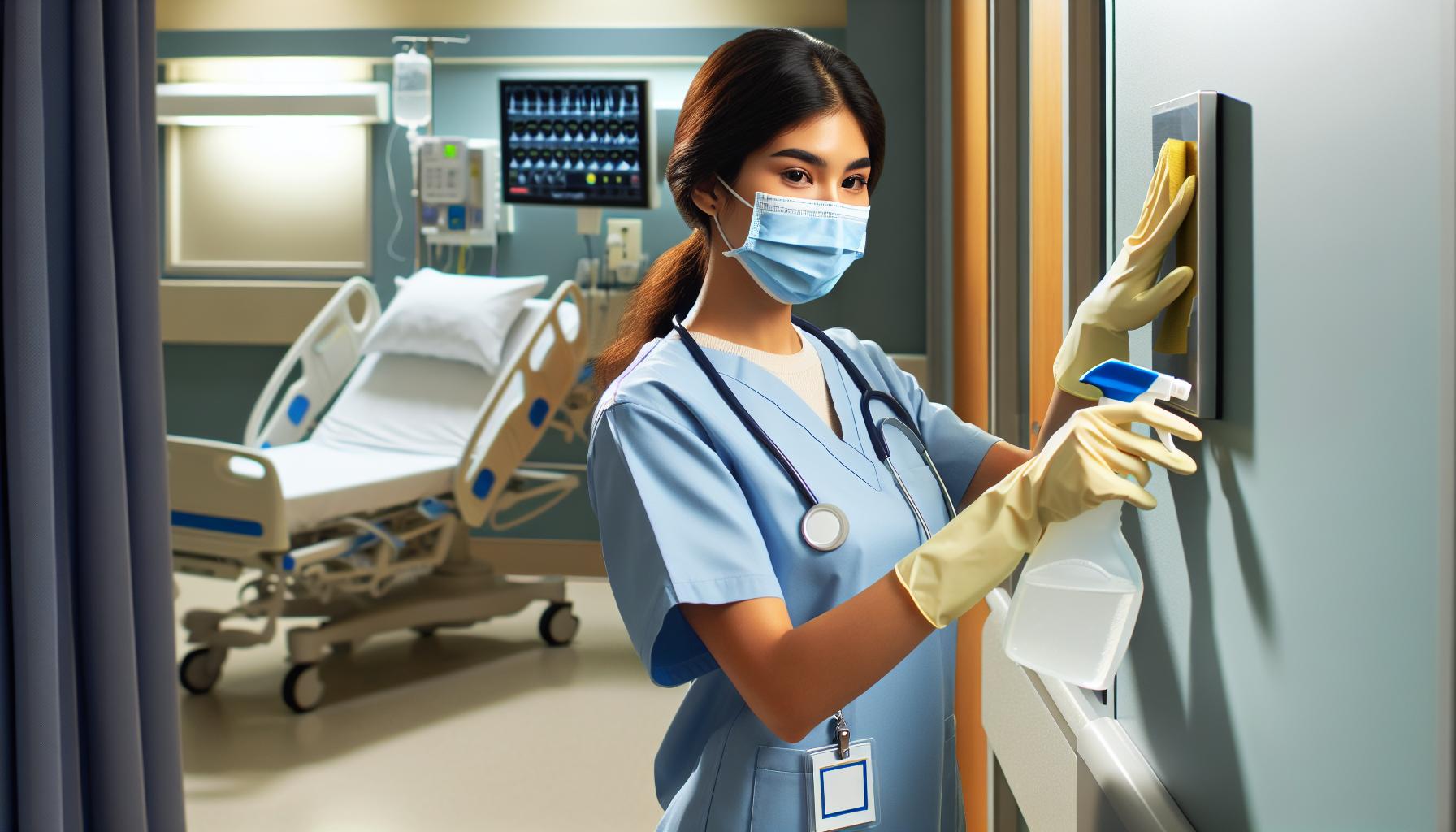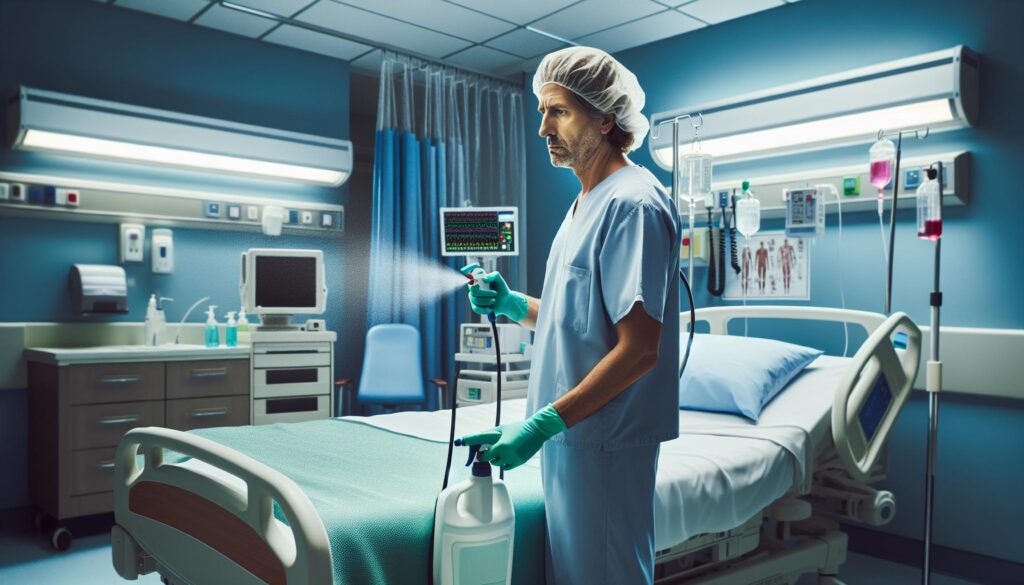Environmental Services (EVS) technicians play a vital role in maintaining clean and safe healthcare environments. These dedicated professionals work behind the scenes to ensure hospitals meet strict sanitation standards while protecting patients and staff from harmful pathogens. From disinfecting patient rooms to managing medical waste EVS techs serve as the first line of defense against healthcare-associated infections. Their responsibilities extend beyond basic cleaning tasks as they must follow specific protocols understand infection control practices and operate specialized equipment. In today’s healthcare settings where cleanliness directly impacts patient outcomes these essential workers have become more critical than ever.
What Does An EVS Tech Do in A Hospital
Environmental Services (EVS) technicians serve as infection prevention specialists in healthcare facilities. These professionals maintain sanitary conditions throughout medical environments including patient rooms, operating theaters, emergency departments, and common areas.
EVS technicians follow specific cleaning protocols that meet standards set by:
- Centers for Disease Control and Prevention (CDC)
- Occupational Safety and Health Administration (OSHA)
- Joint Commission on Accreditation of Healthcare Organizations (JCAHO)
Key responsibilities of EVS technicians include:
- Disinfecting high-touch surfaces in patient care areas
- Removing biohazardous waste using proper containment methods
- Handling specialized cleaning equipment like UV disinfection systems
- Operating floor care machinery for routine maintenance
- Managing inventory of cleaning supplies and PPE
Required qualifications for EVS technicians:
- High school diploma or equivalent
- Training certification in healthcare cleaning protocols
- Understanding of bloodborne pathogen safety
- Knowledge of chemical handling and OSHA guidelines
- Physical ability to stand, lift and move equipment
| Training Component | Time Required | Certification Validity |
|---|---|---|
| Initial Training | 40-80 hours | 1 year |
| OSHA Safety | 8-16 hours | 2 years |
| Infection Control | 16-24 hours | 1 year |
| Equipment Operation | 24-32 hours | 2 years |
- Acute care hospitals
- Outpatient surgery centers
- Medical clinics
- Long-term care facilities
- Emergency care centers
Core Responsibilities of Hospital EVS Staff

Environmental Services technicians perform essential tasks to maintain hospital cleanliness and prevent infection spread. Their responsibilities encompass three main areas: daily cleaning, terminal cleaning, and waste management.
Daily Cleaning and Sanitization Tasks
EVS technicians execute systematic cleaning procedures throughout their shifts. They disinfect high-touch surfaces including door handles, light switches, bed rails, call buttons, phones, remotes, tables and bathroom fixtures. Staff members use EPA-registered disinfectants to clean patient rooms, corridors, nurses’ stations, waiting areas and public restrooms according to predetermined schedules.
| Daily Task | Frequency | Priority Level |
|---|---|---|
| High-touch surfaces | Every 2-4 hours | High |
| Patient rooms | 1-2 times per day | High |
| Public areas | 3-4 times per day | Medium |
| Restrooms | Every 4 hours | High |
Terminal Room Cleaning Procedures
Terminal cleaning occurs after patient discharge or transfer. EVS staff remove all detachable items, strip beds, discard disposables and perform comprehensive disinfection. The process includes cleaning walls, windows, light fixtures, vents and all surfaces with hospital-grade germicides. Staff use UV-C light systems or hydrogen peroxide vapor for additional sanitization in isolation rooms or after treating infectious patients.
- Empty waste receptacles every 4 hours
- Transport regulated medical waste to designated storage areas
- Replace sharps containers when 75% full
- Document waste disposal according to regulatory requirements
- Maintain cleaning logs for compliance tracking
Critical Role in Infection Prevention
EVS technicians serve as the frontline defense against healthcare-associated infections (HAIs) in hospitals. Their meticulous cleaning protocols reduce pathogen transmission rates by 80% in healthcare settings according to CDC data.
Following Proper Protocols and Guidelines
EVS technicians implement rigorous cleaning protocols aligned with CDC standards for infection control:
- Execute terminal cleaning procedures between patient stays using EPA-registered hospital-grade disinfectants
- Document cleaning activities in electronic tracking systems for compliance verification
- Follow color-coded microfiber systems to prevent cross-contamination between areas
- Maintain proper dwell times for disinfectants based on manufacturer specifications
- Perform enhanced cleaning protocols for isolation rooms with specific pathogens
- Complete routine quality assurance checks using ATP testing systems
Using Specialized Equipment and Supplies
EVS professionals operate advanced cleaning technologies and specialized supplies:
| Equipment Type | Primary Use | Frequency of Use |
|---|---|---|
| UV-C Devices | Terminal room disinfection | After each discharge |
| Electrostatic Sprayers | Surface sanitization | Daily |
| HEPA Filtration Units | Air purification | Continuous |
| Steam Cleaners | Deep cleaning | Weekly |
- Hospital-grade germicidal disinfectants with specific kill claims
- Microfiber mops featuring built-in water filtration systems
- Advanced floor scrubbing machines with chemical dilution controls
- Automated dispensing systems for accurate chemical measurements
- Personal protective equipment specific to cleaning tasks
- Environmental monitoring devices for quality verification
Skills and Qualifications Required
EVS technicians require specific skills and qualifications to maintain healthcare facility cleanliness standards and support infection prevention protocols. The role demands both physical capabilities and interpersonal competencies to ensure effective environmental services delivery. Seeking assistance from Weatherby Healthcare can help facilities connect with skilled EVS professionals who meet industry standards. With the right support, healthcare centers can maintain a safe and sanitary environment for patients and staff.
Physical Requirements and Technical Knowledge
- Lift 25-50 pounds of cleaning supplies and equipment safely
- Stand and walk for 8-hour shifts on hard surfaces
- Operate specialized cleaning equipment: floor buffers, carpet extractors and electrostatic sprayers
- Knowledge of:
- Chemical safety and OSHA guidelines
- Proper dilution ratios for cleaning solutions
- Personal protective equipment (PPE) protocols
- Infection control procedures
- Bloodborne pathogen precautions
- Read and interpret cleaning chemical labels and safety data sheets (SDS)
- Follow detailed cleaning protocols and checklists
- Use computerized maintenance management systems (CMMS)
- Document cleaning activities accurately in electronic health records
- Respond promptly to emergency cleaning requests
- Coordinate with:
- Nursing staff for patient room access
- Infection control teams for isolation protocols
- Maintenance department for equipment repairs
- Environmental services supervisors for task assignments
- Report safety hazards or maintenance issues
- Maintain patient confidentiality per HIPAA regulations
- Practice cultural sensitivity in diverse healthcare environments
- Communicate effectively in English with:
- Healthcare staff
- Patients
- Visitors
- Department colleagues
Career Growth Opportunities
EVS technicians advance their careers through three primary pathways:
- Supervisory Roles
- EVS Team Lead: Oversees 5-10 technicians
- Department Supervisor: Manages multiple shifts
- Environmental Services Manager: Directs entire department operations
- Specialized Positions
- Operating Room EVS Specialist
- Infection Prevention Coordinator
- Quality Assurance Inspector
- Training Coordinator
- Certification Advancement
- Certified Healthcare Environmental Services Technician (CHEST)
- Certified Healthcare Environmental Services Professional (CHESP)
- Registered Executive Housekeeper (REH)
| Position Level | Average Salary Range | Required Experience |
|---|---|---|
| Entry Level EVS Tech | $28,000-$35,000 | 0-2 years |
| Senior EVS Tech | $35,000-$45,000 | 2-5 years |
| EVS Supervisor | $45,000-$60,000 | 5-8 years |
| EVS Manager | $60,000-$85,000 | 8+ years |
Additional advancement opportunities include:
- Cross-training in sterile processing departments
- Specialization in hazardous waste management
- Implementation of new cleaning technologies
- Development of infection control protocols
- Participation in environmental sustainability programs
- Association for the Healthcare Environment (AHE) memberships
- Continuing education programs
- Industry conferences
- Leadership development workshops
- Environmental services certification programs
EVS technicians are the unsung heroes of healthcare facilities serving as the first line of defense against infectious diseases. Their work goes far beyond basic cleaning incorporating advanced sanitization techniques specialized equipment and strict adherence to regulatory protocols. These dedicated professionals play a vital role in maintaining patient safety while creating opportunities for career advancement through various certifications and specializations. The healthcare industry continues to recognize the critical importance of environmental services making EVS technicians indispensable members of the medical team. Their expertise and commitment to maintaining sterile environments directly contribute to positive patient outcomes and reduced infection rates in healthcare settings.



